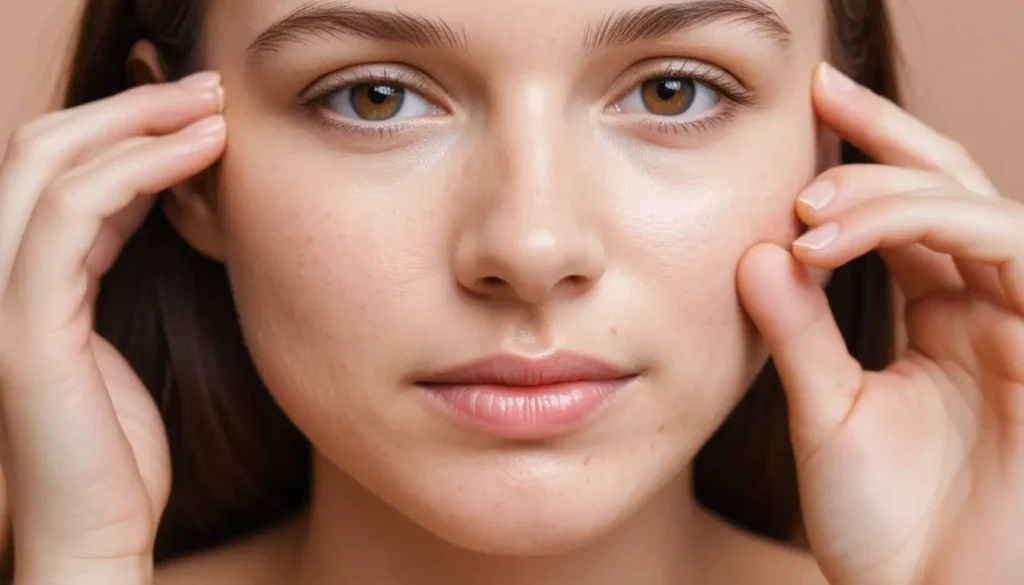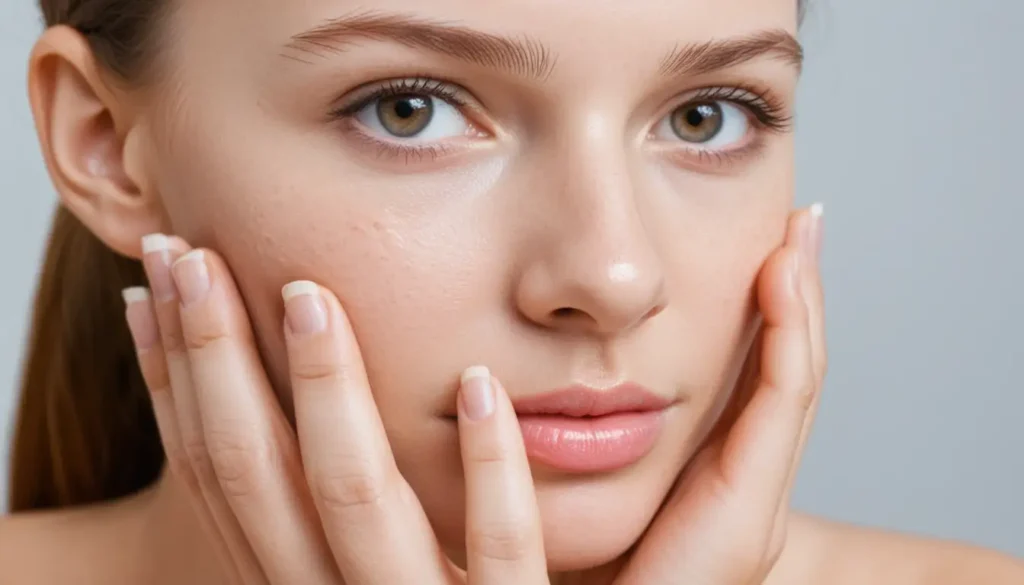Table of Contents
Have you ever experienced that uncomfortable feeling where your Skin Feels Tight But Not Dry? This sensation is more common than you might think and can be quite perplexing. Let’s dive into what causes this feeling, what it means for your skin, and how to address it.

What Does It Mean When Skin Feels Tight But Not Dry?
When your skin feels tight but doesn’t appear dry, it’s often a sign that your skin’s moisture barrier is compromised. This barrier is crucial for keeping moisture in and irritants out. When it’s not functioning optimally, you might experience:
- A feeling of tightness or constriction
- Skin that feels uncomfortable but doesn’t look flaky or dry
- Increased sensitivity
- A shiny appearance without oiliness
Common Causes of Tight-Feeling Skin
Several factors can contribute to this sensation:
Overwashing: Cleansing too frequently or with harsh products can strip the skin of its natural oils.
Hard Water: Minerals in hard water can leave a residue on the skin, leading to tightness.
Climate: Low humidity environments can cause skin to feel tight.
Dehydration: Not drinking enough water can affect your skin’s hydration levels.
Skincare Products: Some products, especially those containing alcohol or fragrances, can be drying.
Hot Showers: Very hot water can strip the skin of its natural oils.
Aging: As we age, our skin produces less natural oils.
The Science Behind Tight-Feeling Skin
Our skin has a natural moisture barrier composed of:
- Lipids (fats)
- Ceramides
- Cholesterol
- Fatty acids
When this barrier is disrupted, it can lead to Trans-Epidermal Water Loss (TEWL), where water escapes from the skin faster than normal. This can result in that tight feeling, even if the skin doesn’t appear visibly dry.
How to Address Tight-Feeling Skin
If you’re experiencing this sensation, try these strategies:
Gentle Cleansing: Use a mild, pH-balanced cleanser.
Hydrating Toner: Apply a hydrating toner immediately after cleansing.
Moisturize: Use a moisturizer rich in ceramides and hyaluronic acid.
Humidifier: Add moisture to the air in your home or office.
Lukewarm Water: Avoid hot water when washing your face or showering.
Stay Hydrated: Drink plenty of water throughout the day.
Avoid Harsh Ingredients: Steer clear of products with alcohol, fragrances, or other potential irritants.
Choosing the Right Products
When selecting skincare products to address tight-feeling skin, look for these ingredients:
- Hyaluronic Acid: Attracts and holds moisture
- Ceramides: Help restore the skin barrier
- Glycerin: A humectant that draws moisture to the skin
- Niacinamide: Helps improve skin barrier function
- Squalane: A lightweight oil that mimics skin’s natural sebum
DIY Remedies for Tight-Feeling Skin
Try these home remedies to soothe tight-feeling skin:
Honey Mask: Apply raw honey to your face for 15-20 minutes, then rinse with lukewarm water.
Oatmeal Bath: Add colloidal oatmeal to your bathwater for a soothing soak.
Aloe Vera: Apply pure aloe vera gel to your skin for instant relief.
When to See a Dermatologist
While tight-feeling skin is often manageable at home, consult a dermatologist if:
- The tightness persists despite home remedies
- You experience redness, itching, or other signs of irritation
- The tight feeling is accompanied by other skin changes
A dermatologist can help identify any underlying conditions and provide targeted treatments.
Myths About Tight-Feeling Skin
Let’s debunk some common misconceptions:
Myth 1: Tight skin means clean skin.
Truth: Tightness is often a sign of over-cleansing or irritation.
Myth 2: You don’t need moisturizer if your skin isn’t visibly dry.
Truth: Even if skin doesn’t look dry, it may still need hydration.
Myth 3: Oily skin can’t feel tight.
Truth: Even oily skin can experience tightness if the moisture barrier is compromised.
The Role of Diet in Skin Health
What you eat can affect how your skin feels. Consider incorporating these skin-friendly foods:
- Fatty fish (for omega-3 fatty acids)
- Avocados (for healthy fats)
- Nuts and seeds (for vitamin E)
- Sweet
- Sweet potatoes (for beta-carotene)
- Citrus fruits (for vitamin C)
- Green tea (for antioxidants)
These foods can help support your skin’s moisture barrier from the inside out.

The Impact of Lifestyle on Skin Tightness
Your daily habits can significantly affect how your skin feels:
Sleep: Lack of sleep can impact skin hydration and barrier function.
Stress: High stress levels can lead to increased skin sensitivity and tightness.
Exercise: Regular exercise improves circulation, which can benefit skin health.
Alcohol and Caffeine: Both can be dehydrating, potentially contributing to skin tightness.
Seasonal Changes and Skin Tightness
Your skin’s needs can change with the seasons:
Winter: Cold air outside and dry heat inside can lead to increased skin tightness.
Summer: Air conditioning and sun exposure can dehydrate the skin.
Spring/Fall: Changing temperatures and humidity levels may require adjustments to your skincare routine.
The Role of Hormones
Hormonal changes can affect skin hydration and oil production:
- Menstrual cycle fluctuations
- Pregnancy
- Menopause
- Thyroid imbalances
If you notice cyclical changes in skin tightness, it might be hormone-related.
Skincare Routine for Tight-Feeling Skin
Here’s a basic routine to help address tight-feeling skin:
- Cleanse with a gentle, hydrating cleanser
- Apply a hydrating toner or essence
- Use a hyaluronic acid serum on damp skin
- Apply a moisturizer with ceramides
- For daytime, finish with a non-drying sunscreen
Night-time additions: Consider adding a facial oil or overnight mask for extra hydration.
The Importance of Patch Testing
When trying new products to address skin tightness, always patch test first:
- Apply a small amount of product to your inner arm
- Cover with a bandage and wait 24 hours
- If no reaction occurs, it’s likely safe to use on your face
This can help prevent further irritation to already sensitive skin.
Environmental Factors and Skin Tightness
Your environment can significantly impact your skin:
Pollution: Can damage the skin barrier, leading to tightness and dehydrationUV Radiation: Can cause damage that affects skin’s ability to retain moisture
Indoor Heating/Cooling: Can dry out the air, leading to skin tightnessConsider using an air purifier and applying an antioxidant serum to protect against environmental stressors.
The Psychology of Skin Tightness
The feeling of tight skin can be more than just physical:
- It can cause anxiety about skin health
- May lead to over-treating the skin, exacerbating the problem
- Can impact self-esteem and confidence
Remember, healthy skin comes in many forms, and temporary tightness doesn’t necessarily indicate a serious problem.
Future Trends in Treating Tight-Feeling Skin
Skincare technology is always evolving. Some exciting developments include:
- Microbiome-balancing products to support skin’s natural flora
- Advanced moisture-binding ingredients that outperform hyaluronic acid
- Personalized skincare routines based on genetic testing
- Smart devices that measure skin hydration levels
Conclusion
Experiencing skin that feels tight but doesn’t appear dry can be frustrating, but it’s a common concern with many potential solutions. By understanding the causes of this sensation and implementing appropriate skincare strategies, you can help restore your skin’s comfort and health.
Remember that everyone’s skin is unique, so what works for one person may not work for another. Be patient with your skin, and don’t hesitate to consult a dermatologist if you’re struggling to find relief.
With the right approach, you can achieve skin that not only looks healthy but feels comfortable too.For more scientific information on skin barrier function and hydration, check out this research article from the Journal of Clinical Medicine: Skin Hydration and Hydrating Products

